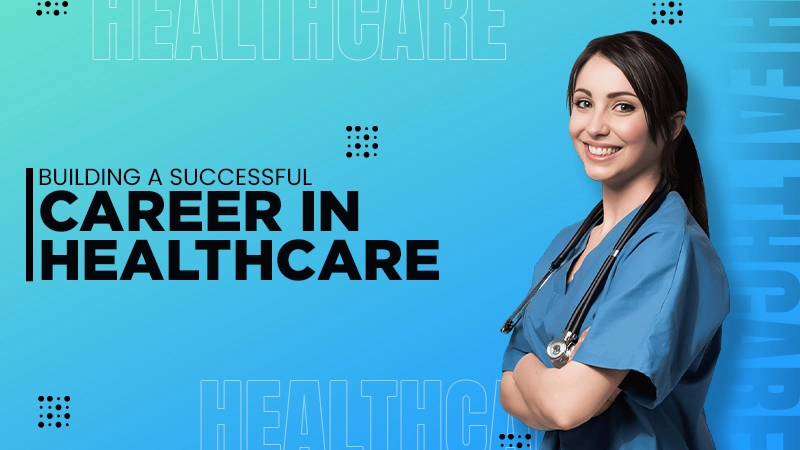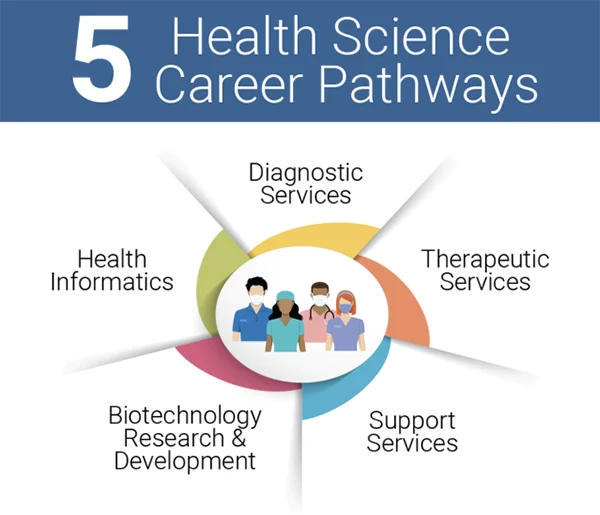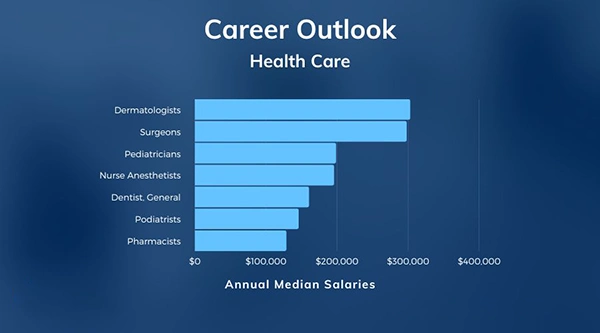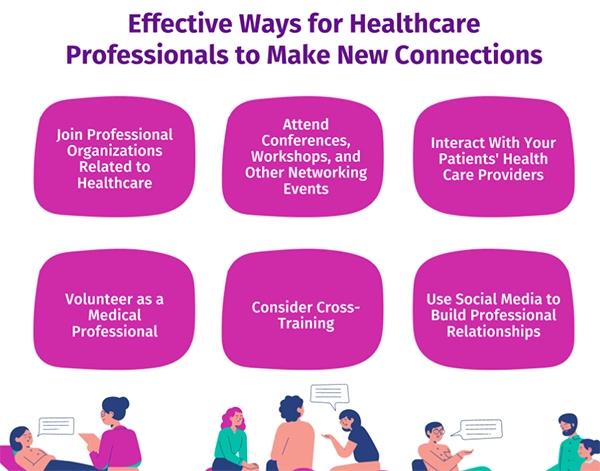
Becoming a part of a respectful and progressive healthcare industry takes a lot of dedication and perseverance. You can pursue a career as a doctor, nurse, pharmacist, physiotherapist, etc.
The competition is high in the medical sector, but so are the rewards that come with it. According to the National Institutes of Health, over 65.1 million health workers comprise the global workforce stock. This is forecasted to increase in the coming years, so be ready to specialize in a related niche.
Yes, it’s a strenuous job with complex working hours, and to start working as a professional it’s relevant to have a medical degree, a license to practice, and years of experience. Plus, a suitable medical expert should possess the qualities to serve selflessly along with interpersonal skills.
Therefore, this article is a comprehensive guide on how to build a successful career in healthcare by studying, networking, specializing in a niche, and more.
Understanding Healthcare Careers

The health sector is vast and multifaceted, where some jobs don’t even require a bachelor’s degree. However, the main career paths in the medical industry are:
- Doctor – general physician or a doctor for a specific medical treatment.
- Registered Nurse – in a private or government hospital or a clinic.
- Diagnostic Services or medical technicians – in pharmacy, phlebotomy, surgical, ultrasound, dental lab, etc.
- Therapeutic Services – CNA or Certified Nurse Assistant, pharmacist, paramedic, occupational therapist, and more.
- Manager and Admin Work – medical secretary, medical transcriptionist, health care administrator, office manager for the clinic, patient service manager, medical record supervisor, etc.
- Biotechnology Research & Development – toxicologist, biomedical engineer, forensic science technician, cytotechnologist, and Epidemiologist.
FAST FACT
Nurse anesthetics, nurse midwives, and nurse practitioners are the fastest-growing healthcare occupations, with over 300,000 jobs in the market.
Exploring APRN Careers
If you dream of furthering your healthcare career from RN or Registered Nurse to APRN (Advanced Practice Registered Nurse), then you are on the right path. This job especially exploded during the COVID-19 pandemic with in-patient services and telehealth consultations.
The demand for APRN careers in healthcare continues to grow due to chronic diseases and mental health conditions impacting all generations worldwide. Besides these, surgeons and dermatologists are the two highest-paying jobs. However, with the rise of AI technology, many aspects of medical care, including Mental Health Billing Services, are undergoing rapid transformation

STATISTICS
The graph shows that the top healthcare occupations are dermatologists, surgeons, pediatricians, and nurse anesthetists.
Educational Requirements
Whatever field of science study you choose, a basic diploma is necessary to get paid well at the entry-level post. Start your career in the medical field by getting certified as follows:
- Diploma
- Undergraduate Degree
- Hospital Managerial Courses
- Masters Program in a specialized niche
- MBA with courses in Healthcare Management
While you continue learning, enhance your interpersonal skills such as communication, teamwork, time management, and problem-solving. Combining medical training with soft skills is the best way for overall job expansion and stability in the medical sector.
Gaining Relevant Experience
Both good and bad experiences contribute to how steadily your career will grow. The medical institutes offer training, certifications, as well as internship opportunities. They provide firsthand experience, working with expert doctors and healthcare professionals.
The specialist prepares students about formal conduct in and around patients, handling technical equipment, and mental strength to manage daily stress. This is a highly competitive field, and to become the best student helps build a strong network of future associates.
Growth in healthcare is also gaining pace, with hospitals offering clients both online and offline facilities through the technology of the future. Over time, patients will have complete and accurate medical reports saved in the cloud and accessible from anywhere.
Networking in the Healthcare Industry

Another necessary skill that medical students should acquire is networking with other colleagues related to medicine. And is possible online as well as offline. As an intern physician, you should attend health conferences and workshops regularly to expand your perspective beyond your specialization.
They are important to gain information, updates, and innovations in the medical field. Volunteering for a colleague and talking to caregivers about a patient’s condition is also a great initiative that will help further your career.
Leveraging Technology in Healthcare
Automation and AI are also being adopted in healthcare, from innovative medical equipment to telehealth. Nowadays, people know how meals, seasons, and packaging impact health.
Therefore, medical professionals are utilizing the advanced technology in the following ways:
- Personalization is offered to each client, with a focus on preventive care, early diagnosis, and effective treatment.
- Wearable technologies, like a smartwatch and health monitors, are more than just a trend.
- Electronic medical reports are accessible to the patient’s physician, labs, and researchers for thorough examination.
- Home care will become popular in the coming years, especially as the aging population grows.
- With the help of DNA chip technology and genetic fingerprinting, risk assessment will become more accurate.
In this way, both the industries of healthcare and technology, collaborate and are working for the betterment of society.
Professional Development and Continuing Education
You may have gained theoretical and practical knowledge, but it isn’t complete without a proper CPD course. Continuing Professional Development programs shape the students to deal with tough situations and remain mentally strong.
It involves exposing students to various workshops and online courses to enhance their overall personality as a leader.
The benefits that it provides to the healthcare professionals are:
- Mastering new medico-technological tools
- Understanding treatment protocols
- Team coordination during emergencies
- Become proficient in clinical skills
- Enhance leadership and management capabilities
- Interacting professionally with peers
- Improved career prospects
Specializing in a Niche
Your career graph will keep progressing if you also specialize in one medical niche. In fact, one way to get paid really well in the healthcare industry is to narrow it down to a specialization of your choice.
Unlike what most people think, it isn’t always the most populated field of expertise that pays well, but an advanced degree and experience in one. Dermatologists and pediatricians are the two most coveted professions, so are becoming a dentist and a pharmacist. Patients also trust a doctor with a specialization instead of going to a general physician.
DO YOU KNOW?
The average doctor has 40,000 hours of training.
Balancing Work and Life
Mark that, there are endless opportunities and responsibilities in healthcare. You are only a bad or good online review away from creating an established career. Though it’s difficult to keep personal life and work separate in this field, those who take care of others like nurses, need more motivation.
Every profession nowadays is hectic, and hospitals want to provide enough downtime to medical professionals so they can relax their minds and body for better performance. With the support of the management and government bodies, more initiatives are required for caregivers besides a good working environment and a salary.
Ethical Practices in Healthcare
As you continue to complete your certification programs and internship, you will become a healthcare professional in a few years. Along the journey will come many challenges to sidetrack and probably make profits with incomplete knowledge.
Individuals in the medical sector should always follow ethical practices because the job impacts the lives of vulnerable people. There’s an increasing number of unfair protocols that are tainting this respectable industry such as data theft of clients, inaccurate diagnoses, etc.
It isn’t easy, but relevant to stay inspired by following experienced healthcare mentors to save your and this profession’s integrity. All the best in taking the first steps towards building a successful career in healthcare!